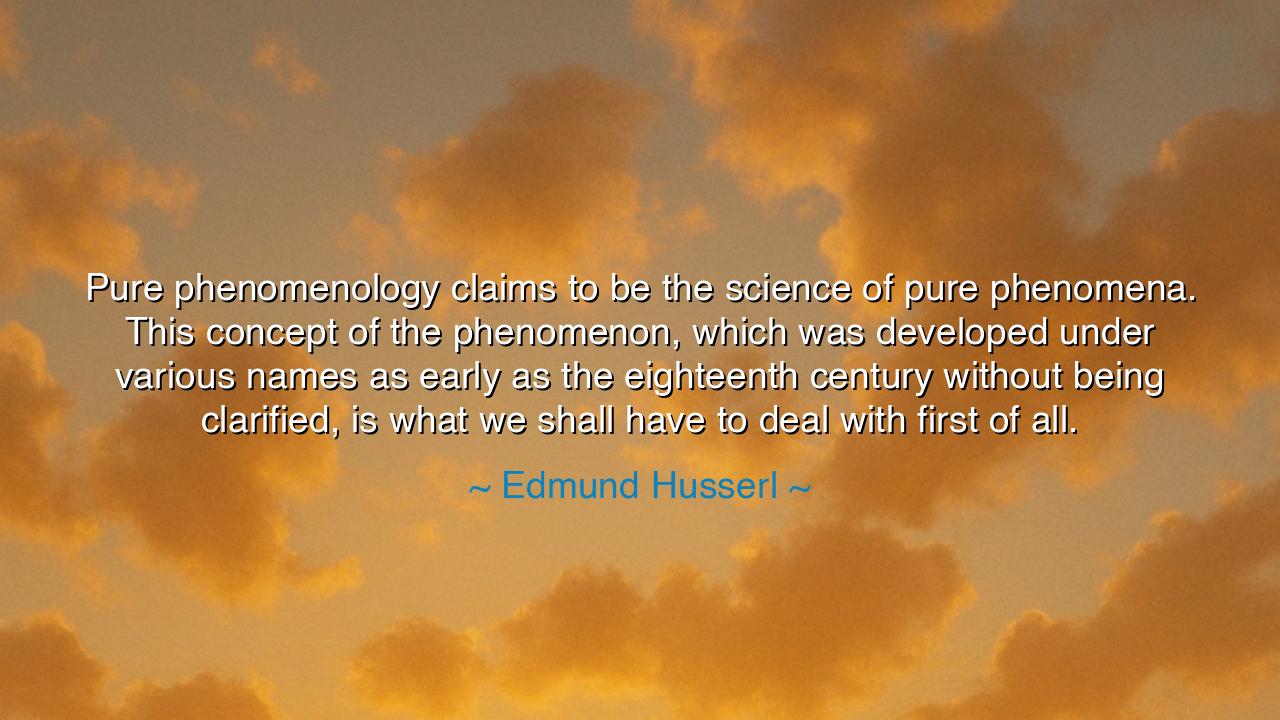
Pure phenomenology claims to be the science of pure phenomena.
Pure phenomenology claims to be the science of pure phenomena. This concept of the phenomenon, which was developed under various names as early as the eighteenth century without being clarified, is what we shall have to deal with first of all.






Hear, O children of wisdom, the words of Edmund Husserl, a philosopher who called us to examine not the world as it is, but the world as it appears to us. He said, "Pure phenomenology claims to be the science of pure phenomena. This concept of the phenomenon, which was developed under various names as early as the eighteenth century without being clarified, is what we shall have to deal with first of all." In these words lies a profound invitation—a call to peel away the layers of assumption and prejudice that cloud our perception of reality, and to examine the very essence of what it means to experience the world.
The ancient philosophers, those seekers of truth, understood that to know the world, one must first understand the mind. Socrates asked his followers to know themselves, to peel back the veil of the self in search of truth. But Husserl speaks of a deeper unveiling, a search for the phenomenon itself—the pure experience of reality before it is colored by our judgments and concepts. Phenomenology, as he names it, is not concerned with the world as it is in the abstract, but with the world as it appears to each individual—the first-person experience. The phenomenon is not just a thing, but an event, a moment of pure awareness.
The phenomenon is something elusive, something often taken for granted. Consider, for example, the way the ancient Greek philosophers sought to understand being. Parmenides, for instance, argued that being itself was unchanging, a singular reality. Yet, his arguments came from a place of abstraction, never fully considering how being is experienced by the human mind. Husserl, too, sought to explore being, but from the ground up, starting with how we perceive the world, how it appears to us. It is not enough to understand being as an abstract idea; we must begin with the lived experience—the phenomenon itself, the things as they present themselves to us in our consciousness.
Consider the story of René Descartes, who, in his search for certainty, famously doubted everything around him. He asked, "How do I know that the world is not an illusion?" Descartes sought certainty in the mind, and in doing so, he arrived at the famous conclusion, "Cogito, ergo sum"—I think, therefore I am. Descartes, in his philosophical inquiry, was not concerned with the material world as it existed in itself, but with the world as it was experienced by the thinking mind. In many ways, Descartes laid the foundation for Husserl’s phenomenology, for it is the very nature of experience and consciousness that Husserl would later seek to explore in its purest form.
Now, O children of the future, Husserl’s call urges us to question not only the world we see, but the very process through which we see it. In the modern world, we often take for granted the way the mind shapes our perception. We are constantly bombarded with information, with interpretations, with stories that shape how we understand the world around us. But what if we were to remove all these external layers? What if we could look upon the world as if seeing it for the first time, experiencing it in its purest form? This is the aim of phenomenology—to examine the world as it appears before all interpretations, all judgments, and all assumptions.
Husserl invites us to return to the moment of experience, to explore the world not as a thing that exists "out there," but as a phenomenon that appears to us in our consciousness. This is not an easy task, for our minds are filled with distractions, with the noise of society, and with preconceived notions. But it is only by peeling back these layers that we can truly begin to understand the essence of our experience, the very fabric of reality. Just as an artist begins with a blank canvas, so too must we begin with the unadulterated experience of the world, free from the weight of preconceived notions.
Let this be your lesson, O seekers of truth: phenomenology teaches us that experience is the starting point of all knowledge. In every moment, we are given the opportunity to see the world with fresh eyes, to experience it anew. Do not take for granted the way the world appears to you, for in that appearance lies the truth of your existence. As you walk your path, remember that your perceptions shape your reality, and it is only by returning to the pure experience of each moment that you can begin to truly understand the world. In this way, you will learn to see not just the surface of things, but the deep essence of existence itself.






AAdministratorAdministrator
Welcome, honored guests. Please leave a comment, we will respond soon